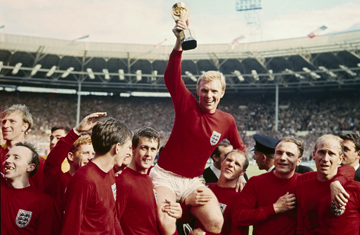
That was then Captain Bobby Moore holds the World Cup trophy aloft at Wembley in 1966
(2 of 3)
But if England's supporters suffer from a superiority complex, it's a behavior consistent with the country's broader sense of self. "It's more to do with the fact that Britain, in general, completely overestimates its importance," says Andy Markovits, a professor of comparative politics and German studies at the University of Michigan who has researched football cultures around the world. Rather than behave like the big boys, Markovits suggests, the Brits would be better served by emulating the Swiss or the Austrians. Not likely, that.
And why should it be, given that England, not Germany or Brazil, claims the world's top league and top teams? That's another vestige of empire, says Markovits. The ubiquity of the English language — amplified in the past 30 years by satellite television — has helped turn British clubs such as Man U, Liverpool and Chelsea into global brands. That has attracted capital and fans from around the world: team owners now include Arab sheiks, Indian chicken magnates, American hedge-fund and real estate operators and Chinese financiers, not to mention the odd Russian oligarch. Worldwide television rights for the Premiership will bring in more than $3 billion annually in the next contract, money that will in turn attract great players.
There are dozens of world-class footballers working the Barclays Premier League. Some of them are English — although never quite enough to make a difference when national teams come out to play. "With this global league as its domestic league, it's difficult for even the best English players to get into these teams," says Ivan Gazidis, CEO of Arsenal, whose team features foreign stars like Holland's Robin van Persie. "That's not surprising, because we're a small island. But the bigger challenge is, How do we develop enough players who are good enough to make these global teams?" (Arsenal counts two England team members: Alex Oxlade-Chamberlain and Theo Walcott.) One deceptively easy answer — to outsiders, anyway — would be to form a U.K. team that included players from Scotland, Wales and Northern Ireland. After all, those countries fight wars together and send a unified team to the Olympics. Ah, but football is different: the Scots relish beating the English. It's why no one from within the Home Nations would entertain the notion of a U.K. football team as even a possibility.
England lags behind the rest of Europe in youth development, having long subscribed to the belief that footballers are born, not made. The Premier League is trying to redress that liability by restructuring its youth-training scheme. In the past, development was local, with promising youngsters going to nearby teams. Now the Premier League is embarking on a best-against-the-best program, giving the top kids from across the country the chance to play against one another and benefit from elite coaching. The goal: 10,000 hours of supervised practice play, considered the threshold level for top-tier performance.
Such changes are needed to stay competitive. Consider that neither England nor Germany advanced to the second round in Euro 2000, but over the past decade, Germany has completely overhauled its program, while England's futility lingers. The Germans were finalists in the 2002 World Cup and served notice at the 2006 World Cup that the rigid, risk-averse game they once mastered was being updated to fit a vibrant young team run by Joachim Löw. In Euro 2012, its Polish-born players Lukas Podolski (headed for Arsenal) and Miroslav Klose will be especially motivated. France, world champions in 1998 and Euro winners in 2000 — but a rebellious disgrace in South Africa two years ago — has also regenerated. Under their new manager Laurent Blanc, the French have forged a stingy defense, which is no surprise, given Blanc's history as the heart of its world-champion team. And with Man City's Samir Nasri and Bayern Munich's Franck Ribéry, France has outstanding midfield attackers.
Defending world and European champion Spain, powered by the twin engines of Barcelona and Real Madrid, has become a dominant force with its stylish passing game. The Spanish arrive dinged up and hardly refreshed — its seven Barcelona-based players won the Copa del Rey on May 25, and the five recent Barcelona-Real Madrid battles may have taken a toll. But Spain's brilliance at possession and a potent attack will keep it alive.
While the Spanish midfield plays like a string quartet, England's midfield veterans Lampard and Gerrard have yet to prove they can work together in any formation. Lampard (who is battling injury) is a football GPS with a genius for putting himself in scoring positions. And at Chelsea he gets the ball in those positions. Liverpool's Gerrard, on the other hand, is like an extra electron that adds energy to a system — although not always where you want it. In Joe Hart, though, England finally has a keeper not poised for disaster. Alas, poor Rooney, a powerful finisher and willing passer with a nonstop motor, will have to idle for two games and pray that the third matters.
